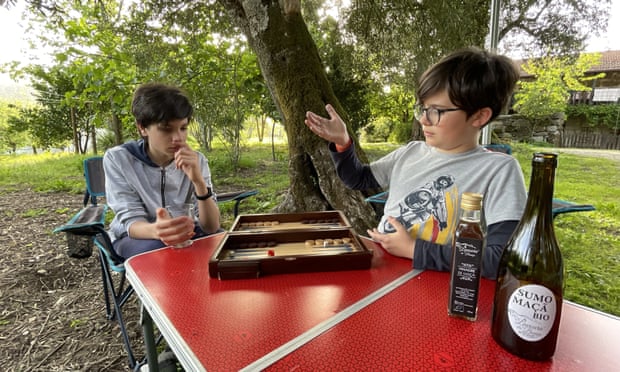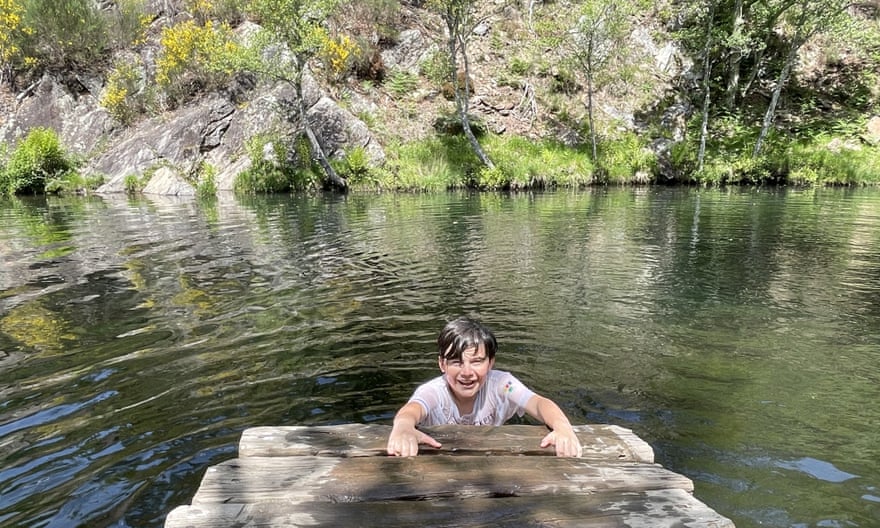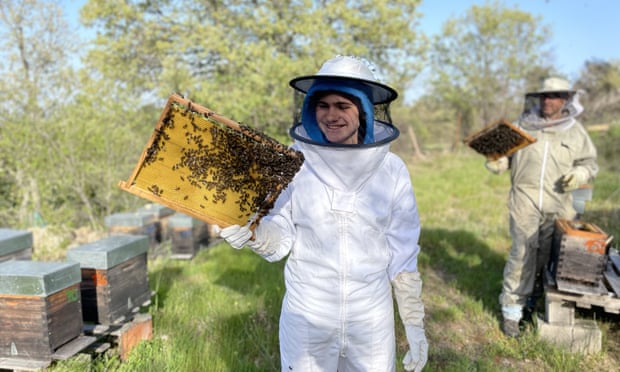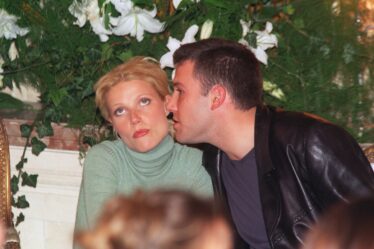
As we pull up at the gate of Lavoura da Bouça, a huge but friendly mastiff is there to meet us. Behind him waddle a gaggle of noisy geese, followed by a scattering of sheep. In the back of our brightly coloured rental van, my two sons and their school friend look doubtful. Have we come to the right place?
Admittedly, the stone farmhouse with its animals and apple orchard does not look like your usual edge-of-town campervan stopover joint. There are no other vans, no facilities (other than a very clean compost toilet), and no illumination other than the stars.
I assure them this rustic spot, an hour-and-a-half’s drive from Porto, is where the EasyCamp website has directed us and so, while it looks like someone’s private home, it must indeed be our destination. Then, as if on cue, Aurora and José, the farm’s cheerful owners, appear from behind a large fruit tree and usher us through the gate.
It’s already late afternoon and by the time we’ve worked out how to unfold the twin set of double beds and located the fold-out table and chairs, the sun is low in the sky. It’s blissfully quiet, a million miles from the industrial garage close to Porto’s airport where we had recently collected the van. The geese are silent, the surrounding hillsides blaze in eventide reds and sun-simmering golds, and, in a moment of phone-free magic, the boys are playing an old-world board game.
Then, to cap it all, Aurora, with all the light-bearing divinity of her namesake, appears with a basket of delicious home-grown goodies. As soon as she’s gone, the boys reach for the freshly squeezed apple juice, while I uncork José’s artisanal wine. The apple vinegar and bag of nuts we store in the van as mementos.
Aurora may have prepared the basket, but the original idea of offering a selection of local produce belongs to EasyCamp’s founders, Teresa and Bruno Matos. Inspired by the examples of France Passion and Brit Stops – two leading booking systems that point motorhome users to off-beat stopover sites – the Lisbon-based couple set up an online platform back in 2019 that would point holidaymakers to campervan-friendly quintas (or farms).
Today, EasyCamp has around 60 such sites in Portugal, clustered mostly in the central belt, its rural heartlands. The idea is to help holidaymakers “escape the asphalt” of motorhome parks while also offering a “taste of the countryside”. The second point is literal: instead of paying a subscription or a nightly fee to park, EasyCamp’s booking site invites visitors merely to purchase a basket of goods like the one Aurora presented us with – prices of the basket vary depending on the host site.

Quinta, as a quick scan of EasyCamp’s online map reveals, is a relatively loose term. Options range from fairly high-end wineries, such as Fita Preta in Alentejo, to small-scale cheesemakers, fruit growers, and even an aromatic plant producer. What links them is their owners’ love of their respective corner of Portuguese countryside – plus a willingness to throw open their doors to strangers.
Which is precisely what our next hosts do. “Relax,” Laura, the co-owner of Apibéricos, texts me when I contact her to say we are running late. “No rush.” We’d set off late, courtesy of a second tour by Aurora and José, this time of other sites they have in and around the village (a list that includes a tiny mill house and a gorgeous strip of shady riverbank). Then, driving through Alvão natural park on our way south to Apibéricos, we stumbled on a delightful riverside picnic spot along the Rio Olo. By the time the boys were done with dive bombing, rope-swinging and generally rollicking around in the water, it was already mid-afternoon.

Fortunately, we didn’t have far to drive, and after we parked, Laura offered us a tour, with the added requirement of a beekeeping suit. A purveyor of half-a-dozen superb different honeys, Apibéricos boasts around a thousand hives dotted around various locations close to its base on the Vila Real border of the Douro Valley. “Do the bees sting?” the youngest wants to know. “Yes,” Laura responds, with brutal honesty. His face blanches behind his helmet netting. “But not often,” she adds. “And if they do, you’re unlikely to die.”
I sense this information does not console him, but we set off all the same and enjoy a fascinating hour with Laura and her husband, Vitor, learning about all things beekeeping. When our basket arrives later with various types of honey (“Brits like the heather flavour the best”) and a small jar of pollen (“rich in protein”), we appreciate it all the more for having seen the worker bees hard at it. Later that evening, she recommends a restaurant in the next village for dinner. The moelas (gizzards) and tripas (tripe) are a must, she tells us. The boys’ friend translates, and I duly go alone.
Our final stopover is Greenval, an hour or so south of Porto, on the edge of the beautiful Serra da Freita mountain range. Owned by another charming couple, Isabel and João, the farmstead is perched on a plateau with stunning views west towards the distant ocean. At the centre of the site, which is dotted with various repurposed shipping containers, is a spacious hen coop. Around the edge wander two sheep, watched avidly by a pair of underemployed but very friendly guard dogs.
I have in mind an early night, but Isabel and João suggest we all go for a meal nearby at Mira Freita. A restaurant with 120 covers in a village of 40 residents seems highly ambitious, but the familial atmosphere and fantastic meat dishes make it a well-known favourite. Over one of the largest and most succulent steak dishes (vitela no forno a lenha) I’ve ever eaten, we pass a very companionable couple of hours chatting about the delights of country life (both are former townies) and their hopes for the future.
Felgueira is a friendly village. João tells me about how he recently got chatting to a local man he knows who owns a donkey. The man showed João how to halter the good-natured beast and then issued him with a “donkey driving licence”.
João is now planning a hike in the hills, with pack animal in tow. Would I like to join him? Of course, I reply. From campervan to donkey: for a holiday experience designed to get us off the beaten track, it feels like the kind of destination that would meet with Teresa and Bruno’s approval. We’ll be back soon.


